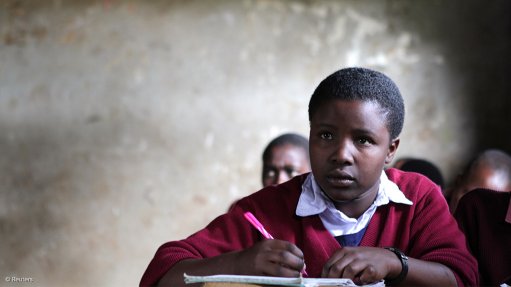
Photo by: Reuters
The 2014 matric results, which revealed a 2.4 percentage point drop in the national pass rate, has again put the spotlight on the need for private, independent schooling at all levels, from preschool to tertiary education, to support South Africa’s education sector, specialist risk finance company Business Partners executive director Gerrie van Biljon has said.
“Education remains a major challenge in South Africa and has a direct impact on the current skills shortage in various facets of the local economy.
“However, [these challenges] provide opportunities for existing and aspiring entrepreneurs to meet the growing need to improve and expand the sector as well as fill the gap that public schooling leaves, delivering access to lifelong learning, education and training to students.”
Speaking to Engineering News Online in a telephone interview, Van Biljon noted that this would not be an easy feat, as “South Africa is not a conducive environment for entrepreneurship”.
“Looking at the results of international survey Entrepreneurial Monitor, which looks at a country’s economic activity, South Africa is not faring well. We scored lower than developing countries such as Brazil and India. It’s a culture issue; we don’t have the culture for entrepreneurship, which is alarming,” he stated.
Van Biljon added that, for a country to have successful entrepreneurs, it needed a culture where it was easy for entrepreneurs to enter the market, citing bureaucracy, licensing, labour and legislation as some of the biggest stumbling blocks.
“I also don’t believe incentives [by government] are sufficient for [the country] to have an environment where people [want to become entrepreneurs].
He maintained that entrepreneurs could provide additional facilities and services to aspiring learners and, thereby, increase the country’s knowledge and skills base.
“Given that [learners] without a National Senior Certificate are unable to enrol for a university qualification, they may consider other education or training facilities to further their studies. This may vary from a hotel school to graphic design, and this offers entrepreneurs opportunities to provide a service to this market.
“With many young South Africans also realising that a matric is no longer sufficient to ensure a sound career, specialist training becomes an attractive option. Entrepreneurs can satisfy this growing need by offering either short or long speciality courses.”
Meanwhile, Van Biljon pointed out that the R150-million Business Partners Education Fund, launched by the company in November, was specifically aimed at financing businesses such as privately owned schools, colleges, educational buildings and student accommodation, and provided support for entrepreneurs who aimed to augment the shortcomings in the South African education system.
The fund was allocated over a five-year period. However, should the fund reach its limit of R150-million before the end of the five-year period, Business Partners would evaluate the amount still needed for financing and would provide adequate funds to complete the project.
MD Nazeem Martin added that the fund specifically targeted small and medium-sized enterprises.
HELPING ENTREPRENEURS
To date, Business Partners has assisted some entrepreneurs to further their business. One such entrepreneur was Delia Cupido, from the Western Cape.
Cupido first opened her own estate agency, Delia Properties, in 2005. In 2006, together with her husband, Colin, and with a R700 000 loan from Business Partners, she bought Chameleon Preschool and Educare Centre in Sybrand Park. She has since bought two more preschools and employs 40 staff members.
Cupido believed the Business Partners Education Fund would assist many entrepreneurs in her position.